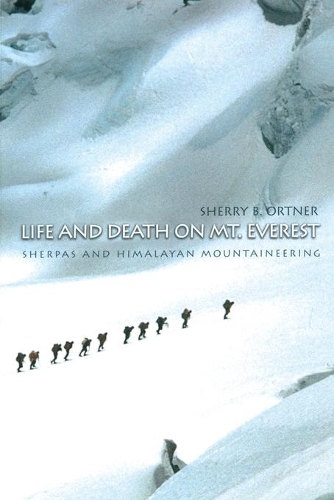
Life and Death on Mt. Everest: Sherpas and Himalayan Mountaineering
(Paperback)
Publishing Details
Life and Death on Mt. Everest: Sherpas and Himalayan Mountaineering
By (Author) Sherry B. Ortner
Princeton University Press
Princeton University Press
15th May 2001
United States
Classifications
Professional and Scholarly
Non Fiction
Anthropology
Climbing and mountaineering
305.891495
Winner of School of American Research J.I. Staley Prize 2004
Physical Properties
Paperback
392
Width 152mm, Height 235mm
510g
Description
The Sherpas were dead, two more victims of an attempt to scale Mt. Everest. Members of a French climbing expedition, sensitive perhaps about leaving the bodies where they could not be recovered, rolled them off a steep mountain face. One body, however, crashed to a stop near Sherpas on a separate expedition far below. They stared at the frozen corpse, stunned. They said nothing, but an American climber observing the scene interpreted their thoughts: Nobody would throw the body of a white climber off Mt. Everest. For more than a century, climbers from around the world have journ-eyed to test themselves on Everest's treacherous slopes, enlisting the expert aid of the Sherpas who live in the area. Drawing on years of field research in the Himalayas, renowned anthropologist Sherry Ortner presents a compelling account of the evolving relationship between the mountaineers and the Sherpas, a relationship of mutual dependence and cultural conflict played out in an environment of mortal risk.Ortner explores this relationship partly through gripping accounts of expeditions--often in the climbers' own words--ranging from nineteenth-century forays by the British through the historic ascent of Hillary and Tenzing to the disasters described in Jon Krakauer's Into Thin Air. She reveals the climbers, or "sahibs," to use the Sherpas' phrase, as countercultural romantics, seeking to transcend the vulgarity and materialism of modernity through the rigor and beauty of mountaineering. She shows how climbers' behavior toward the Sherpas has ranged from kindness to cruelty, from cultural sensitivity to derision. Ortner traces the political and economic factors that led the Sherpas to join expeditions and examines the impact of climbing on their traditional culture, religion, and identity. She examines Sherpas' attitude toward death, the implications of the shared masculinity of Sherpas and sahibs, and the relationship between Sherpas and the increasing number of women climbers. Ortner also tackles debates about whether the Sherpas have been "spoiled" by mountaineering and whether climbing itself has been spoiled by commercialism.
Reviews
Winner of the J.I. Staley Prize "[Ortner's book] written so clearly and with such evident fascination with the subject that it's more than just accessible to lay readers: it's captivating. I've had anthropology texts put me to sleep right after morning coffee, but this one kept me awake at night."--Michael Parfit, New York Times Book Review "Having lived and worked with the Sherpas for more than thirty years as a serious anthropologist, Ortner is in an ideal position to introduce the other, unknown culture involved with Himalayan climbing... Fascinating."--Pico Iyer, New York Review of Books "The book brings us a much richer understanding of the cultural partnership underpinning Himalayan mountaineering... Life and Death on Mt. Everest is a swift and canny guide to this uncharted territory."--Alison Demos, Lingua Franca "Sherry Ortner reveals the details of Sherpa life on and off the mountain and sweeps away a century of misguided characterizations... [This] book is one of those rare crossover works, a scholarly exploration of Sherpa culture that the lay reader (climber or not) will find utterly fascinating."--Newsday "[A] first-rate study... [Ortner] is an intelligent and fair-minded scholar who has combed the mountain literature and fused it with what she observed in the field."--David Craig, Los Angeles Times "A remarkable display of agile fieldwork, sensitive to all the distinctive shadings that compose [the] subject... Ortner arrives at a complex but cohesive portrait of the century-long Sherpa association with the mountaineers..."--Kirkus Reviews "This is not another nail-biting saga of alpine disaster, but rather--finally--an authoritative study of the group that has made summiting 8,000-meter Himalayan peaks possible for Westerners... Ortner retells the Everest story from the Sherpa point of view..."--Outside "A fascinating examination of the world of the Sherpas... [Ortner's] book is an eye-opening, behind-the-scenes look at mountaineering."--Library Journal "A well-written and thorough account...and the only book on this topic."--Choice "A fascinating new study of the interaction between Western climbers and Sherpas..."--Susan Spano, Los Angeles Times
Author Bio
Sherry B. Ortner is Professor of Anthropology at Columbia University. Her most recent publications include The Fate of "Culture": Geertz and Beyond and Making Gender. The Politics and Erotics of Culture. She has received numerous prestigious awards, including the John D. and Catherine T. MacArthur Foundation Fellowship.
